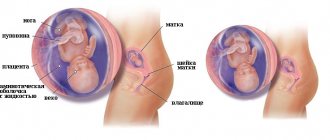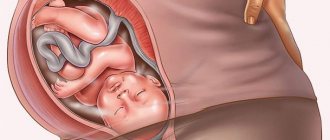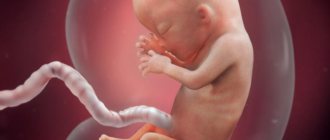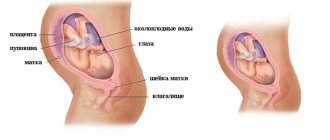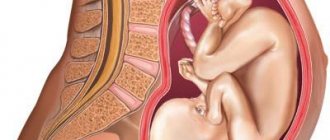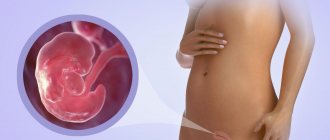What's happening to the baby?
At the 9th week of pregnancy, new important organs and endocrine glands form in the fetus:
- The cerebellum, responsible for coordination of movements;
- The lymph nodes;
- The pituitary gland, which produces its own hormones;
- The middle layer of the adrenal glands, which produces adrenaline;
- Mammary gland.
The appearance of the fetus undergoes changes - lips can already be distinguished on the face, as well as eyes covered with eyelids. The neck is clearly defined, the head is no longer pressed to the body. The fruit gradually begins to straighten, although its silhouette is still similar in shape to a pea pod. The baby's limbs are growing, and the beginnings of fingers have appeared on their inner side, facing the palms and feet.
Fruit size:
- Weight – about 4 g;
- Length – from 22 to 30 mm.
The movements of the arms and legs are becoming more active, as the bone base of the fetus is strengthened and muscle tissue is growing. At week 9, the cranial, spinal and intervertebral nerve nodes are actively developing, although the nervous system has already begun to function. The cardiac activity of the fetus is improved, the frequent beating of a small heart is clearly detected during an ultrasound.
The formation of the lungs, intestines, and genitals continues, and the swallowing reflex appears. The fetal kidneys enter into water exchange - swallowed amniotic fluid is excreted from the body in the form of urine. These waste products exit through the umbilical cord and enter the mother's body, increasing the load on her kidneys.
Video about what happens to the fetus, the importance of communication with the unborn child, and notifying the employer about pregnancy:
What does a baby sense, feel and communicate at nine weeks of birth?
First of all, this week your baby is characterized by high activity and restlessness (even in sleep). The back arches, the arms and legs involuntarily fly up, the child begins to feel himself in this world.
Achievements of a nine-week-old baby (what he can do)
- In the “belly” position, he tries to raise his head and holds it for about 15 seconds.
- Reacts to bright objects.
- Turns the head to follow an object or sound.
- Rolls over from the “side” position to the back or tummy.
- Allows you to pull yourself into a sitting or standing position.
- Lying on his belly, he tries to rest his hands on the surface of the table (sofa).
- Looks to the right/left while lying on his back.
- Constantly makes “pug-shaped faces” - facial expressions at this age are the most fantastic.
- Reaches for a toy that lies near him.
- Hit the toy (can't pick it up yet).
- If you put a toy in a baby’s fist, it will squeeze it tightly and even shake it.
- Examines his legs and arms.
- He enjoys watching his mother , who is busy circling the room with her worries and activities.
- Watches the TV - the changing pictures.
- Studying children playing nearby , pets, fluttering curtains, light sources.
- If mom eats next to her, look at her mouth.
- He studies the facial expressions of his relatives and listens with pleasure to the voices that he already knows.
- Makes sounds , babbles, coos, sings vowels, listens to himself.
- Listens to songs , conversations, voices from the street.
- Tries to attract mom's attention with sounds.
- Tries to roll from belly to back or back (be careful, don’t leave the baby where the baby could fall!).
- Lying on its belly, it pushes off the surface with its legs.
What does an ultrasound show?
At the 9th week of pregnancy, an ultrasound examination of the fetus is carried out not according to the plan of the obstetrician-gynecologist, but for medical reasons. At this stage, you can determine the exact duration of pregnancy, assess the condition of the umbilical cord and the thickness of the placenta, and listen to the fetal heartbeat (130-150 beats per minute). According to the study, it is not yet possible to find out the sex of the unborn child; this will take several more weeks. Against the background of a dark uterus, with high-resolution equipment, the head and body of the fetus are clearly visible.
What happens to the woman?
At 9 weeks, the pregnant uterus reaches the size of a grapefruit; the increase in the abdomen at this stage is minimal and does not yet allow one to notice pregnancy by external signs. However, the growing layer of fatty tissue, provided as a supply of nutrients during breastfeeding, makes the female figure somewhat heavier.
The swelling of the breasts is more noticeable, which by this time may increase by 1-2 sizes. It is important to monitor the health of the mammary glands and wear comfortable bras of the appropriate size made from natural fabrics. Tight underwear makes breathing difficult and can cause fainting and lack of oxygen in the fetus.
The skin of a pregnant woman is exposed to the influence of hormones, it becomes smooth and soft, and acne rashes disappear. Some expectant mothers may experience increased dryness of hair and facial skin due to changes in water metabolism. To prevent such manifestations, you need to improve your drinking regime and introduce more plant fiber into your diet.
To prevent the lack of calcium, which a woman shares with her unborn child, from affecting the condition of her teeth and bones, more dairy products should be consumed.
Due to changes in metabolism and pressure from the uterus on the bladder, a woman may urinate more frequently. It is important to distinguish this process from the onset of cystitis, which is often found in pregnant women.
Recommendations
Week 9 involves proper nutrition, and agreement with a nutritionist on the diet the child needs, based on tests (for example, the presence of anemia, or lack of iron in the body). Particular attention should be paid to getting fresh air and physical activity. It is necessary to take walks in the fresh air so that the child receives as much oxygen as possible. If you experience constant fatigue and apathy, you need to rest more often, pay attention to your appearance, listen to good music and read good books. The concept of severity should be limited, negative emotions should be excluded, in order to avoid negative scenarios you need to register and undergo regular medical examinations. During this period, a woman should be treated especially carefully.
Feelings of the expectant mother
The most pronounced sensations are associated with early toxicosis, when a woman feels nausea in the morning and during the day, she vomits from 1 to 5 times a day. You can help yourself with a mild form of toxicosis without the help of a doctor. It is enough to have breakfast without getting out of bed, carry water with you and drink it throughout the day, and in case of an attack of nausea, use a light “snack” in the form of an apple, cracker, or cookie. Frequent vomiting and severe symptoms of toxicosis require treatment under the supervision of a specialist.
The restructuring of the body causes the following symptoms:
- Increased fatigue;
- Lethargy and drowsiness;
- Appetite disorders;
- Increased need for fresh air;
- Emotional imbalance;
- Nasal congestion;
- Hypersensitivity to odors.
The increased sensitivity of pregnant women to odors leads to irritability and aversion to certain aromas, and nausea when smelling them. There is selectivity to certain foods, a reluctance to eat previously favorite dishes and a desire for exotic and unusual food.
Discharge - norm and deviations
Normal vaginal discharge is small in volume and white or yellowish in color. Spotting brown discharge may appear due to cervical erosion, a pathological condition that should be treated immediately after childbirth. A change in the color of vaginal discharge or an unpleasant odor may be a symptom of an STD infection and requires contacting a specialist.
Bloody discharge of any intensity, accompanied by cramping pain in the lower abdomen and lower back, indicates a threat of miscarriage. Increased bleeding is dangerous not only for the fetus, but also for the life of the mother. You should go to bed immediately and seek emergency medical attention.
Discharge from the breasts that leaves yellow spots on the underwear is colostrum, which normally appears at a later date. If there is intense colostrum secretion, you need to wear and change bra pads regularly, otherwise a bacterial infection may develop.
Rules for caring for a nine-week-old baby: how to cope with emerging problems?
No matter how “motionless” your little one may seem to you, it is strictly forbidden to leave him alone on a surface without sides. Gone are the days when you could leave your baby on the couch and run to the bathroom. It only takes a few seconds for the baby to roll over and slide to the floor.
Therefore, from the 9th week, start seriously thinking about the safety of the child and do not leave him alone!
What else do you need to remember this week?
- Sleep rules Teach your little one to sleep correctly.
Come up with a ritual that he will remember as a good tradition - bathing, feeding, mother's lullaby and night sleep. Eliminate all sources of bright light and sound while sleeping at night. Do not play with the baby during the night feeding: once fed, go back to the crib. Teach your child to fall asleep on his own, without motion sickness and long games! - The baby's head is sweating. This problem occurs quite often.
The reasons are a lack of vitamin D, endocrine problems or simple overheating. Pay attention and, if necessary, consult your pediatrician. - Crusts on the head They can either cover the entire top of the child’s head or be present as separate areas. These crusts do not require treatment. They are carefully and delicately removed with a soft baby brush after a bath and softening (for example, Vaseline).
- Fontana The timing of closure of the fontanelles is as follows: small - by 2 months, large - three to 3 to 24 months.
A shorter or longer closing period is not considered a problem. But it makes sense to see a doctor if the fontanel is sunken (observed at elevated temperatures, dehydration) or protruding (intracranial pressure). Self-medication is unacceptable! - Fighting constipation All mothers go through childhood constipation at this young age of children. If constipation is not the norm and brings discomfort to the baby, then it’s time to adjust the mother’s diet, give the baby a tummy massage ( approx. clockwise only), lay the baby on the tummy as often as possible, and give laxative teas (Plantex, for example).
As a last resort, use a gas outlet tube - often it is enough to insert it 1.5 cm, after lubricating it with cream, and the problem is solved. - Loose stools At this age, the stool itself is not yet particularly well-formed (just a mush). Therefore, it is important to distinguish loose stools from normal ones.
If the stool foams, has impurities (lumps, blood, mucus), changes color to green and has an unpleasant odor, consult a doctor!In other cases there is no reason to worry. Note to mothers: artificial stool is more liquid, darker and has a specific smell - this is the norm. But lumps in the stool should be a reason to reconsider the choice of mixture.
- Vitamin D deficiency The first signs of rickets in many babies appear at this age (sweating, balding neck, increased number of urinations, excitability).
Be careful and consult your pediatrician in a timely manner! - Refusing diapers It's time to change them to onesies, if you haven't already.
Don't wrap your child up. After all, even at room temperature of 21-22 degrees in the middle of winter, rompers alone are enough (woolen socks are useless). When wrapped, the baby begins to sweat, overheats and then easily catches a cold from the usual draft.
Pain at 9 weeks
When there is a threat of miscarriage, nagging, pronounced pain appears above the pubis, radiating to the lower back. They indicate the beginning of detachment of the fertilized egg. With timely measures taken, the process can be stopped, preserving the pregnancy.
Pain localized in the sacrum indicates compression of the sciatic nerve by the uterus. For severe pain, wearing a special bandage is recommended. Abdominal pain not accompanied by bleeding may be associated with intestinal colic. After consultation with a specialist, the drug No-spa and diet correction are prescribed.
Possible problems
In addition to early toxicosis, which significantly aggravates a woman’s condition, other complications may occur:
- Frozen pregnancy.
If the signs of toxicosis suddenly stop, and bloody discharge with an unpleasant odor appears, this may be a symptom of the cessation of fetal development and its death. Such a serious complication requires a thorough examination of the woman to avoid recurrence of the problem. Possible reasons for pregnancy failure may be abdominal trauma, a fall, the influence of bad habits, genetically determined fetal malformations, and malnutrition.
- Abortion.
A woman has the right to terminate an unwanted pregnancy up to 12 weeks. An abortion is performed under the influence of painkillers in a hospital setting. Every decision to terminate a pregnancy must be weighed, since in addition to moral problems, infertility and other serious complications may arise.
- Constipation.
Difficulty defecating is a problem for many pregnant women, caused by changes in the functionality of the body. In order not to provoke hemorrhoids, you need to consult a doctor about the use of safe laxatives and include plant fiber in your diet.
- Fever and cold.
At the 9th week of pregnancy, a constantly felt increase in temperature to +37.0+37.4°C is still possible, caused by the action of the pregnancy hormone progesterone and intensive metabolism. Higher rates, accompanied by a cough, runny nose, and sore throat are signs of ARVI or acute respiratory infections. Their treatment should be agreed with a specialist; do not use medications not intended for pregnant women. If there are no contraindications, you can drink tea with raspberries, lingonberry juice, decoctions of medicinal herbs, gargle with soda solution, and rinse your nose with products based on sea water.
- Multiple pregnancy.
Two or more fetuses in the uterus require close attention to the woman’s health and careful management of the pregnancy. While multiple pregnancy does not require increased nutrition, it does not manifest itself in a special way. It is enough to follow the general recommendations and register with the antenatal clinic in a timely manner. There may be restrictions associated with sexual intercourse in the 9th week of multiple pregnancy due to the threat of miscarriage.
Complications of pregnancy
Severe toxicosis shows that not everything in the body of the expectant mother is good. How to understand that nausea and other signs threaten a woman’s normal well-being? Here are the warning signs:
- nausea is felt almost constantly;
- vomiting is frequent, more than twice a day (if more than five times, see a doctor immediately);
- the body reacts “storm” to any food;
- weight loss causes weakness and a severe decrease in hemoglobin levels in the blood (anemia).
All these signs require medical attention.
Constipation
Many pregnant women have intestinal problems. The most unpleasant thing is constipation. Of course, you absolutely must not strain yourself in the toilet! Firstly, it is bad for the unborn baby. Secondly, you can provoke the appearance of hemorrhoids. There is only one way out - to establish nutrition so that the intestines work correctly and fully. In acute cases, the doctor may prescribe a local laxative. It is not recommended for the expectant mother to select such medications, even if the drug is recommended by pharmacists at the pharmacy.
Stomach ache
The expectant mother needs to be careful if her stomach hurts every now and then. This could be flatulence or the threat of miscarriage. In the first case, pain can occur in any part of the abdomen; they are combined with bloating and the release of gases from the intestines. In the second case, the pain seems to grab from within (doctors call this cramping) and radiates to the lower back. There is often a feeling that the stomach is pulling. If bloody discharge appears, the threat of miscarriage is more obvious.
Frozen pregnancy
An equally alarming sign is the abrupt cessation of all manifestations of pregnancy. The sudden disappearance of toxicosis and other “pregnant” sensations may be a sign of arrested fetal development. A frozen pregnancy in the 9th obstetric week is a serious complication. It requires a thorough examination and a number of medical measures.
Spontaneous termination of pregnancy (fading or miscarriage) can happen for various reasons:
- genetic abnormalities;
- poor nutrition;
- bad habits;
- Unhealthy Lifestyle;
- injuries, falls.
Abortion
However, pregnancy can be terminated at the request of the woman herself. Until the 12th week, every expectant mother has the right to make a decision and refuse to continue bearing the fetus. It is important to remember: negative emotions, separation from the father of the unborn baby, or the desire to “live for yourself” are bad advisers in this matter. The decision regarding abortion must be a responsible one. The termination of pregnancy itself is performed in medical institutions under the strict supervision of medical specialists.
What tests should I take at 9 weeks of pregnancy?
The ninth obstetric week is the optimal period for registration at the antenatal clinic. Now you will have to regularly visit your doctor for examination and timely resolution of problems related to the health of the woman and fetus.
During the initial visit, the doctor will collect an anamnesis about previous births and pregnancies, family genetic pathologies, and the woman’s living and working conditions. He will measure the woman’s height and weight, blood pressure, pelvic parameters, and the height of the uterus in the pelvis.
Laboratory tests when registering for pregnancy:
- General urine test to determine protein content - an indicator of inflammatory processes;
- General blood analysis;
- Blood to determine the group and Rh factor;
- Blood biochemistry analysis;
- Blood for sugar, HIV and syphilis;
- Vaginal smear for cytology and flora;
- A smear to determine the causative agents of STDs.
The doctor will perform a gynecological examination and colposcopy to determine the exclusion of inflammatory diseases of the reproductive organs. A woman should also be examined by an ophthalmologist, dentist, otolaryngologist, hematologist and therapist to make sure there are no somatic diseases that could affect the course of pregnancy.
The woman will receive recommendations on organizing proper nutrition, work and rest schedule, and the use of vitamin and mineral complexes.
Factors affecting the fetus
Throughout pregnancy, the connection between the blood of the mother and the fetus is carried out through blood vessels. And until a full-fledged placental barrier is “built,” any negative factors entering the mother’s blood will increase the risk of delayed development and formation of the child’s organs and systems. Therefore, the following factors are prohibited:
- smoking, inhalation of cigarette smoke (vasospasms, especially uterine ones, which occur during smoking, lead to oxygen starvation and suffocation of the fetus;
- drinking alcohol (alcohol will destroy the cells of the fetus and ultimately kill it);
- the use of tetracycline antibiotics (they are deposited and destroy the child’s teeth);
- chemicals and airborne particles;
- use of anabolic steroids;
- be exposed to ionizing radiation.
In cases where the risk of miscarriage increases, the woman is recommended to be hospitalized with bed rest.
Diet and vitamins
There are no special instructions for creating a menu for this period. It is enough to follow the general recommendations, eat foods and dishes with sufficient protein, fats and carbohydrates. Lean meat and fish, dairy products, a variety of cereals, natural sweets (marshmallows, marmalade), fruits and vegetables have such properties.
The appearance of constipation requires the exclusion of fresh bread, tea, cocoa, coffee, and rice dishes from the diet. It is healthy to eat figs, cucumbers, grapes, carrot and cabbage salads.
If a blood test reveals that a woman has a low hemoglobin level, she needs to take medications based on it and consume the following foods:
- Boiled and steamed beef, liver;
- Red fruits - pomegranates, apples;
- Pomegranate juice;
- Dried fruits – dried apricots, prunes, raisins;
- Nuts.
A woman should drink enough liquid - kefir, fruit and vegetable juices, green tea, milk.
Video about nutrition at 9 weeks and its effect on fetal development:
